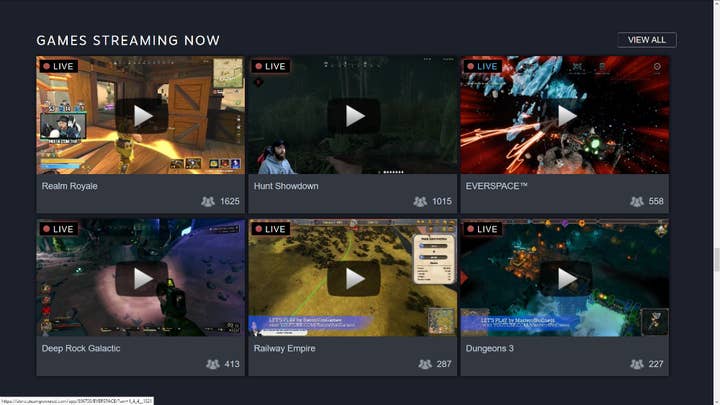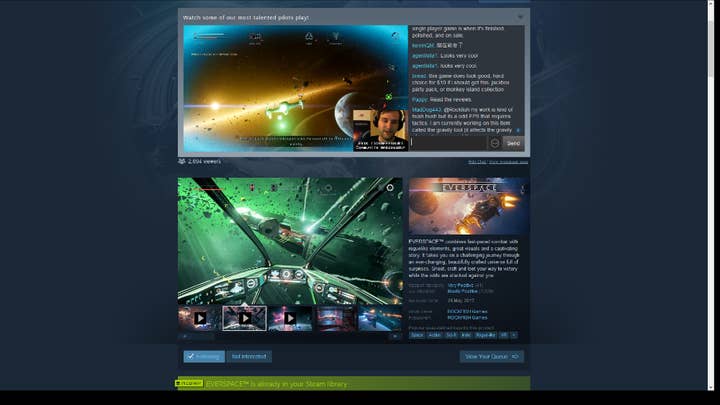Rockfish: Live Steam broadcasting will change the game for indie marketing
Valve's store page streaming beta helped Everspace to its highest ever single-day revenue, says CEO Michael Schade
The reality of independent development is often defined by getting a lot from a little. In a world of small teams, smaller budgets, and intense competition for whatever tiny shard of audience attention that comes your way, a studio needs to be ready to grab every opportunity and push as far as possible before it's gone
The Hamburg-based developer Rockfish has done exactly that over the last few years, building the success of its debut game Everspace through incremental progress and unwavering vigilance; being ready to take full advantage of any chance to attract new customers and make new sales.
Speaking to GamesIndustry.biz at Develop:Brighton, Rockfish CEO Michael Schade demonstrated a new strategy for doing just that; one available at minimal cost to developers beyond the investment of their time, one that amplifies the organic traffic flowing through the busiest marketplace for PC games on the internet: live broadcasting directly from a game's Steam store page, a new feature introduced by Valve for this year's Summer Sale, the beta for which Rockfish was invited to join just two days before the sale started.
"We were the number one broadcast on Steam on that day of the sale. Better than PUBG, better than Dead Cells"
It should be noted that Rockfish had a clear advantage in this year's Summer Sale: Everspace was featured on the front page of Steam, which would be a guarantee of extra traffic to any game's store page. However, it was the fifth time that Everspace has been featured in this way, and its commercial performance during the sale (even when it was no longer featured) was markedly different.
More importantly, the fact that Everspace was featured at all was no accident; rather, it was the end result of several years of consistent effort from a studio that had no experience of PC when it was founded in 2014.
"At the very beginning I didn't know anybody at Steam," Schade says. "When we started that was one of our biggest concerns; coming from mobile to PC I didn't know anybody. But Everspace proves that you don't need to know Steam... [We got noticed] just the performance of the first two days in Early Access, because we'd put so much into the launch. You can get featured, and you can take it from there."
If Rockfish built this position of strength slowly, it had very little time to organise the concentrated period of live-streaming the beta demanded. Here, again, the studio's previous work yielded benefits, as it already had relationships with streamers that were cultivated across the entire lifespan of Everspace.

"Our top pilots were streaming," Schade said, noting that Rockfish had contracted three of those pilots to stream around the recent PS4 launch of Everspace. "I've built a relationship with them over the last two or three years - ever since our closed alpha. Our top pilots are some of our backers from the Kickstarter. They've clocked more than 200 hours in the game. They play Everspace better than I do."
The schedule opened with four hours of live broadcasting on day one, then seven hours on day two; in the final week of the sale - by which point Rockfish had enlisted two additional Everspace pilots to share the load - it was broadcasting for around ten hours each day, peaking at 14 hours on July 4.
"It took us a while to ramp this up," Schade says. "It was insane to get that sorted out and organised."
"The concurrent viewers are on par with being on the front page of Twitch, and you don't have to pay for it"
Broadcasting has been available to Steam users for some time, but previously it wasn't possible for developers on their product pages. The ability to actually watch a game being streamed in the exact same place that a user makes the decision to buy it has obvious potential, Schade says, and that's amplified by the fact that the single biggest source of organic traffic to the Everspace page is Steam itself. Directing that much traffic from an external streaming platform would be enormously costly, running into thousands of dollars each day.
But that potential manifested in reality almost immediately. On the first day of the sale, the stream on the Everspace page had 5,000 concurrent viewers at its peak.
"We were the number one broadcast on Steam on that day of the sale," Schade says. "Better than PUBG, better than Dead Cells, even though they both had a sale as well. Maybe that's because Everspace is so visually intense. Maybe that's because a lot of people haven't seen it yet."
The first day's stream was hosted by one of Everspace's elite pilots, playing a "Hardcore" mode so difficult that Schade admitted he couldn't survive "even for two seconds" - a perfect showcase for the game's highly polished visuals. The second day was hosted by Rockfish itself, the first time the studio had streamed anything at all, and it still attracted a peak 3,300 concurrent viewers.

"We'd never streamed," Schade admits, "but because we streamed to the store page, because there's so much traffic coming anyway, it goes through the roof. This [concurrent viewers] is on par with being on the front page of Twitch, and you don't have to pay for it.
"We got the traffic for free because we were featured. Then we just had to make sure that the person streaming is the best we could find, and we saw the conversion rate go up."
In this new context, what constitutes the "best" streamer is very different. On Twitch, that generally means the streamer that can bring the most followers; during a Steam sale, when each store page can be a destination in its own right, it is more about showcasing the game in the most varied and flattering ways. For example, another streamer Rockfish used plays in "Berserker" mode, which removes defensive shields and, in doing so, "takes the game to new territory."
"This was the best sale that we ever had. It was better than our full release"
"If he plays Everspace on his Twitch account, and I tweet it and push it as hard as I can without spending money, we're lucky if we get 20 viewers," Schade says, noting that the streamer in question only has 189 followers. "Simply because of [Steam's] organic traffic, at the end of the sale, when we weren't featured on the home page any more, this streamer clocked 560 viewers."
Rockfish isn't able to reveal unit sales, but Schade offered a comparison between the 2018 Summer Sale, when Everspace was discounted by 67 per cent, and the 2017 Winter Sale, when it was discounted by 50 per cent. The comparison is not exact, Schade admits, but the difference in Everspace's commercial performance is so striking that store page broadcasting was an obvious factor.
In the Summer Sale, the sales conversion rate for Everspace was as much as 136 per cent higher than on the equivalent day in the Winter Sale, when store page broadcasts were not available. "And this is not just one day," Schade notes. "Towards the end [of the sale] it's pretty much every day."
In fact, there was no day during the Summer Sale that Everspace wasn't converting at a minimum 10 per cent higher rate than the Winter Sale, and the average across the entire period was around 50 per cent. According to Schade, the first day of the Summer Sale - when Everspace was the number one broadcast, with 5,000 peak concurrent viewers - was the single best day for both unit sales and revenue in the game's lifetime.

In our conversation, Schade refers to store page broadcasting on Steam as a "game changer" - both for developers with limited resources for marketing, and for streamers who struggle to be noticed next to those with huge numbers of followers.
"It means that smaller streamers can qualify to be one of the best streamers in a certain game, and they can be paid for playing that game," he explains. "If you're a small streamer, a variety streamer, you don't get enough viewers to live on a CPM model. Now you can be very good at Everspace - or any other specific game - and you can get paid by the developer or the publisher to play it when there's a lot of traffic coming through Steam."
"Indie devs often say they have no money for marketing... You don't have cash marketing, but you can still have time"
Since the sale, Rockfish has signed two of the streamers to full-time contracts. They will broadcast from the Everspace store page on a regular basis, allow it to ramp up more quickly during the next Steam sale, and also help with, "community management, QA, and giving feedback on game design." Indeed, the goal with future sales is to have Everspace pilots running streams on a full 24-hour schedule.
"This is with ten hours of streaming per day on average," Schade says. "Imagine if we had 24 hours. If you have 24 hours top broadcasting, live, with people [from the studio] in chat, my estimate would be a conversion rate 100 to 200 per cent [better] compared to without broadcasting.
"This was the best sale that we ever had. It was better than our full release."
Not every sale will be so successful for every developer, of course. Rockfish has earned for every one of its Steam features, just as it earned all of the people who had Everspace on their Wishlists, and many studios will have that long process of incremental improvement still ahead. But the amplifying effect that store page broadcasting had on organic traffic, and converting that traffic to sales, is difficult to ignore. In Schade's view, it could reap significant rewards for all of those developers trying to make a lot out of a little.
"Indie devs often say they have no money for marketing. That's fine. You don't have cash marketing, but you can still have time. Instead of putting another feature in [to the game], you can stream.
"A developer broadcast on Twitch doesn't help you, because nobody sees it. But if you have a developer broadcast on your Steam store page you get tons more views. Even if you're not a very popular game, you'll still get way more traffic than if you did the same on Twitch right now. If you also have your team in chat answering questions, this is going to increase your conversion rate significantly.
"This is brand new, [implemented] three weeks ago. We will see a significant improvement of the system, and it already works so well."
